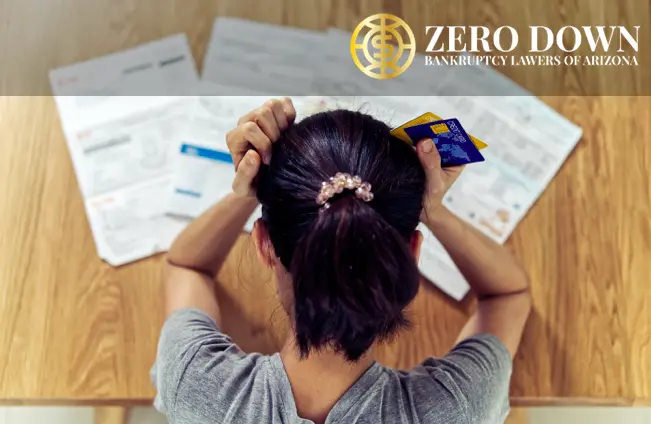The bankruptcy attorneys at Arizona Zero Down Bankruptcy take a look at some telltale signs that you may want to consider filing for bankruptcy protection as a method of debt relief. If bankruptcy may be an option that you wish to consider, please give our Phoenix Bankruptcy Law Office a call at (602) 609-7000.
Declaring Bankruptcy in Arizona

You are disqualified from filing bankruptcy again for a number of years after you file bankruptcy, depending on which chapter you file. Bankruptcy can also have a negative impact on your credit score. Therefore, bankruptcy isn’t a decision that should be taken lightly. Here are some signs that it may be time to consider filing bankruptcy to address your debt problems.
Signs that you should seek the help of an Arizona Bankruptcy Attorney.
- Your phone is constantly bombarded with creditor calls. Before proceeding with more aggressive methods of collection like repossession and foreclosure, your creditors will try calling you to obtain some form of payment. However, if the money isn’t there, constant calls won’t do anything to change that. If your phone rings all day long with creditors trying to recoup some money from you, it may be time to consider bankruptcy. If this is an issue for you, you should retain a bankruptcy attorney. Once your creditors have been informed of your bankruptcy attorney, they are no longer allowed to contact you and must direct all calls to your attorney.
- Credit cards have become a way of life for you. Even if it’s just for reasonable purchases like groceries and other necessities, it’s a red flag if you rely on credit cards to afford the things you need. This problem will only continue to get worse if you don’t do anything about it.
- Your debt keeps you up at night. If you spend all night tossing and turning because you’re worrying about your debt, it’s time to find a solution. Bankruptcy might just be that solution.
- You’ve already drained your savings account. Having a savings account for emergencies can create a sense of security. A job loss, illness or injury, or juggling debts can all cause those savings to dwindle. If you have already spent your financial safety net, it may be time to think about bankruptcy.
- Your lenders are threatening to repossess your assets. Many people in Phoenix and throughout Arizona have a number of assets financed, such as a vehicle, cell phone, furniture, and home appliances. Depending on the terms of your contract, missing just one payment could be grounds for your lender to repossess the asset. However, they will likely call and tell you of their intention to repossess before actually doing it. If your lenders are threatening to repossess your vehicle and other assets, it may be time to consider bankruptcy.
- You are denied for new lines of credit. Bankruptcy can hurt your credit, but the credit of those who file often isn’t that stellar to begin with. Poor credit can make it more difficult to be approved for new credit cards and other lines of credit. This may only leave you with riskier forms of borrowing, such as title loans. You should consult with a Phoenix bankruptcy attorney from AZ $0 Down Bankruptcy if you are unable to open new lines of credit due to your credit history.
- You have stacks of unpaid, unopened bills. Being in debt can sometimes mean prioritizing payment of some expenses instead of less essential bills. If you’re considering declaring bankruptcy, hold on to these bills. You can provide them to your bankruptcy attorney for inclusion in your creditor mailing matrix just in case these debts haven’t made it to your credit report yet.
- You have received a summons. When you have missed too many payments on a debt, your creditor may pursue a judgment against you. Your creditor will file a suit and have you served with a summons to appear in court about the debt. If you don’t have any valid defenses, or fail to appear, the court will order a judgment against you. This can seriously damage your credit, as well as other potential negative consequences.
- Your wages are, or are about to be, garnished. After a creditor has obtained a judgment against you in court, they can then pursue a wage garnishment. It can be embarrassing for your employer to be served with a writ of garnishment for your debts, and that garnishment can drastically reduce your income. Most debts can be garnished somewhere between 15-25%, but child support debts can be garnished as high as 65% in Arizona.
- You’re considering debt settlement or a consolidation loan. Businesses that specialize in these types of debt management charge high fees without paying off much of your debt. Bankruptcy discharges all eligible debts in one fell swoop, and the pricing is clear and honest. Before signing anything with a debt settlement company, make sure you first have a free consultation with a bankruptcy attorney.
What can filing bankruptcy in Arizona do for you?

A common misconception about bankruptcy is that you will have to give up all your assets to be able to file. This is only partially true in Chapter 7 cases. You will be able to keep any assets that are protected by your state’s bankruptcy exemptions. For example, in Arizona, you may have up to $150,000 equity in your home in a Chapter 7 bankruptcy. You can also have up to $6,000 equity in one vehicle as a single filer, or $12,000 in one vehicle or $6,000 each in two vehicles as a married filer. These exemptions don’t apply in Chapter 13 bankruptcy, and you can keep any asset that you will be able to afford in your payment plan.
Filing bankruptcy may hurt your credit score initially, but may also cause a dramatic increase over time. Filers with a medium to low credit score may see no effect on their score after filing, or even see an increase almost immediately. You can take steps after your bankruptcy to improve your credit score, because you won’t be permanently banned from new lines of credit and financing. You can open a new credit card as soon as your case is discharged, and finance a new vehicle after your case has been filed.
Should I File bankruptcy Now that it is 2021?
There are many factors that will go into determining whether filing bankruptcy is a good solution for you at this time. If you were one of the millions of Americans who lost their jobs due to the coronavirus pandemic in 2020, it could be an advantageous time to file. Your reduction in income could actually help you qualify for Chapter 7 if you otherwise only would’ve qualified for Chapter 13. If you still only qualify for Chapter 13, your plan payments will be far lower after a reduction in income.
One thing to keep in mind before filing bankruptcy is that your credit cards and other lines of credit will be frozen during your case. If you regularly need to use credit cards to pay for essentials, this will no longer be available to you once you file your petition. Your case may also be jeopardized if you used your credit card for luxury purchases and excessive cash advances before your bankruptcy.
Another issue that comes into play in the timing of your bankruptcy is your potential tax refund. While bankruptcy trustees are generally not allowed to take your pandemic stimulus checks, your trustee may be able to seize your tax refund and distribute it to your creditors, depending on the time of year your taxes are filed, when you receive your refund, and how much it is. If your tax refund is a vital part of your annual financial plan, you should consult with a Phoenix bankruptcy attorney about how it may be impacted before filing your bankruptcy.
A final consideration that may be especially relevant during and after a pandemic is that it is almost impossible to get divorced during a bankruptcy. The Automatic Stay protects your assets by freezing them, but creates a roadblock in the property division portion of a divorce. This will delay your divorce for months in a Chapter 7 bankruptcy, and years in an AZ Ch 13 BK. Consult with an attorney before proceeding with either of your legal matters.
Hiring an Arizona Bankruptcy Attorney in Arizona
Drowning in debts is stressful, and making the decision about bankruptcy can be another potential stressor on your list. You deserve experienced, knowledgeable legal counsel to guide you through these trying times. Whether it’s income qualification, application of state exemptions to your assets, calculating your payment plan proposal, drafting and filing your petition and creditor mailing matrix, and any other part of the bankruptcy process, our staff and attorneys will be here to assist you every step of the way.
Don’t assume that affording a quality bankruptcy attorney is out of reach for you. Your initial consultation is 100% free with no obligation to you. Our Phoenix bankruptcy lawyers strive to make expert representation affordable for everyone, and offer flexible payment options. Additionally, you may even be eligible to file for $0 down! Therefore, to learn more about your bankruptcy options as well as payment plans available to you, call Arizona Zero Down Bankruptcy today to schedule your free consultation. (602) 609-7000.








